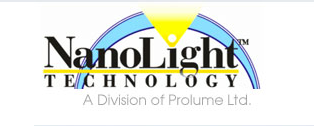
Nanolight/Prolume Purple II/367-10/10 mgs
商品编号:
367-10
市场价:
¥19900.00
美元价:
11940.00
产品分类:
荧光染料
公司分类:
Fluorescent_dyes
联系Q Q:
3392242852
电话号码:
4000-520-616
电子邮箱:
info@ebiomall.com
商品介绍
ProlumePurpleII orMethoxy-Coelenterazine-Methoxy(Me-O-CTZ-O-Me)isanewsyntheticanalogueofCoelenterazine withtwoadditional methoxygroupsemittingat400nmwithRenillaLuciferase8(RLuc8)andGreenRenillaLuciferase. Nanolight™Technologies developedProlumePurpleII(USPatent2013/057660).
ProlumePurpleII exhibitsanupto5-foldhigherluminescencethanCTZ400a(“deepblueC”).
CompoundID: | ProlumePurpleII(PP-IICTZ) |
alternativename: | Methoxy-Coelenterazine-Methoxy(Me-O-CTZ-O-Me) |
Structure: | C28H25N3O3 |
MW: | 451.5 |
Solvent: | WerecommendNanoFuelSolvent.SolubilityinEthanolisverylow. |
Structure: |  |
ActivitycomparedtoCTZ-400a:
|  |
EmissionspecswithRLuc8:
|  |
HowToUseProlumePurpleII
CertificateofAnalysis HPLC MSDS NMR
Theluciferinisshippedasfiltered,lyophilized,batchcontrolledsubstrate in250ugaliquots.
1mg=4x250ug. 10mgsarepackedasregularpowderinonetube.
1mg=4x250ug. 10mgsarepackedasregularpowderinonetube.
Theadvantagesoflyophilizedluciferinsare:
- pre-aliquotedinsmallamounts,freshsubstrateforeverysetofexperiments
- longshelf-life(packedunderArgon)
- fastertodissolveduetoitsfinecrystalstructure
- consistentqualitybetweenaliquotes
Shipping:viaFedExorUPSatRT,overnightor2nddelivery.Storeat-20Corbelow
品牌介绍
The Brightest Light …
NanoLight® Technologies is a division of Prolume Ltd., formed by Prolume’s founder Dr. Bruce Bryan and a group of excellent co-founders from Prolume® Ltd. namely Byron Ballou PhD; Gene Finely MD; Chris Szent-Gyorgyi PhD; Randall Murphy PhD and Miroslav Trampota.
Nanolight® Technology is a biotechnology company developing broad applications of natural, light-emitting marine proteins, or marine bioluminescence. The NanoLight division is focused on becoming the leader in high-value reagent & reporter systems for new product development in the pharmaceutical, agrichemical, and research products industries.
Valuable life science uses for NanoLight®’s technology include high-throughput drug discovery, functional genomics, tumor imaging, replacement of radioisotopes, and molecular diagnostics. One particularly exciting application is the ability to use NanoLight®’s reporter systems to “illuminate” gene and molecular function within living cells, allowing pharmaceutical companies a revolutionary method to study drug activity. A second opportunity is to broadly supply researchers who are increasingly moving away from radioactive reagents toward light-based reporter systems and instruments. NanoLight® Technologies is poised to capitalize on both of these accelerating market trends.
NanoLight’s competitive advantage
Our advantage is based on three crucial proprietary positions:
Access to the novel bioluminescent and fluorescent protein molecules.
World’s lowest-cost production technology for coelenterazine (NanoFuel™), necessary for light emission.
World’s largest collection of expression libraries from marine bioluminescent organisms.These proprietary technologies, which NanoLight has already developed or protected by patent filings & trade secrets, permit the company to grow into the dominant supplier of proprietary bioluminescent reagents and reporter systems to the life science markets. NanoLight® can immediately provide partners access to:
Novel GFP genes isolated from Ptilosarcus gurneyi and Renilla Mulleri with distinctive properties including a novel chromophore sequence that differs in 3 of 6 residues from the Aequorea GFP.
Novel marine luciferases cloned from Renilla Mulleri, Pleuromama sp., and Gaussia sp., the latter appears to be brighter than existing Renilla or Firefly systems in mammalian cells.
Pending patents on the novel use of bioluminescent proteins on silicon chips for inexpensive high throughput screening and diagnostic applications.
cDNA libraries from over forty (40) different luminescent organisms for further gene discovery patenting, and licensing.
Proprietary functional screening methods to identify new bioluminescent genes.
This enormous genetic resource represents an outstanding opportunity for leading life sciences companies racing to establish advanced high-throughput screening and diagnostic systems.
联络我们



